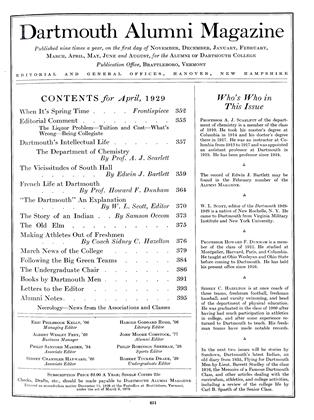The weather in Hanover during February and March is watched by undergraduates almost as closely as by the farmers of the valleys and hill towns of the district. The last week of February brought the best skiing weather in the memory of the present college generation. Much snow fell during a spell of cold weather and the crust coming after a day or two was ideal. Dad Bowman, barber to Dartmouth men for years back, said that it was the first old-fashioned winter snowstorm since 1895. Not knowing the town's oldest living habitant we can't verify that.
March has brought the customary slush and the consequent woofing ("grousing" is the old word for that) although at the time of writing practically all of the snow has gone and the impassable roads remain as the last sign of winter. Fortunately for New Hampshire's road commissioners this has been a better and more snowy winter than last year's. The winter of 1927-28 will be remembered for years in these parts as one everlasting thaw and freeze; the result was that ruts sank deeper and deeper.
The grumbling of March has all but passed in the hope of a warmer vacation in a section more southern than Grafton County. The tours to Bermuda are gaining more popularity each year and are gradually supplanting the erstwhile popular trip to Washington. Of course most students will spend the holiday at home and a few Westerners and mountain climbing enthusiasts will stay in town for trips to Outing Club cabins.
Some of the energy not spent in complaining, attending The Nugget or playing bridge has gone into listening to the many lectures which Dartmouth has offered during the month. The lecturer with the biggest name in academic circles has been Robert Briffault, a sociologist of international fame. He was invited by President Hopkins to lecture on the Guernsey Center Moore Foundation and spoke five afternoons at two-day intervals. His subject, "The Biological Basis of Social Science" was handled in the light of his knowledge of the history of the family. Dr. Briffault is best known as the author of "The Mothers," a three-volume work, of which the main thesis is that the human mind, in all that distinguishes it from the mind of animals, is a social product and not a biological product, and that the social characters of the human mind were determined exclusively by the operation of the maternal instinct.
The lecture series of second importance was that of The International Institute, an organization founded by The Dartmouth Christian Association to discuss foreign affairs. The first speaker was W. J. Abbot, former editor of The Christian Science Monitor and a contributor to many periodicals and papers. He spoke on "The Press and the Foreign Interests of the United States." Dr. S. G. Inman, an author on subjects connected with Latin-America, and a former teacher in universities of Chile and Mexico, had as his subject, "Latin-America looks at the United States." The third speaker, L. C. Porter, professor of the University of Peking, gave a lecture on "The Impact of Western Civilization on the Far East." Mr. Abbot spoke for international peace and attributed occasional threats to peace to unscrupulous editors in home offices. Dr. Inman, said that friendly relations between the two continents of America would come when our policy of intervention liad been given up and Professor Porter charged that the recent unrest and development in China could be traced to the policy of aggression and imperialism which the western nations employed there.
 View Full Issue
View Full Issue
More From This Issue
-
 Class Notes
Class NotesCLASS OF 1923
April 1929 By Truman T. Metzel, "Charlie Chadbourne" -
 Article
ArticleThe Vicissitudes of South Hall
April 1929 By Edwin J. Bartlett -
 Lettter from the Editor
Lettter from the EditorEditorial Comment
April 1929 -
 Article
ArticleFrench Life at Dartmouth
April 1929 By Howard F. Dunham -
 Class Notes
Class NotesCLASS OF 1899
April 1929 By Louis P. Benezet -
 Article
Article"The Dartmouth," An Explanation
April 1929 By W. L. Scott, Editor
Robert T. Drake
-
 Article
ArticleGlee Club Victory
APRIL 1929 By Robert T. Drake -
 Article
ArticlePhi Beta Kappa
APRIL 1929 By Robert T. Drake -
 Article
ArticleCarnival Pictorial
APRIL 1929 By Robert T. Drake -
 Article
ArticleCurrent Events Contest
APRIL 1929 By Robert T. Drake -
 Article
ArticleThe Dart
APRIL 1929 By Robert T. Drake -
 Article
ArticleClass Election Results
APRIL 1929 By Robert T. Drake







